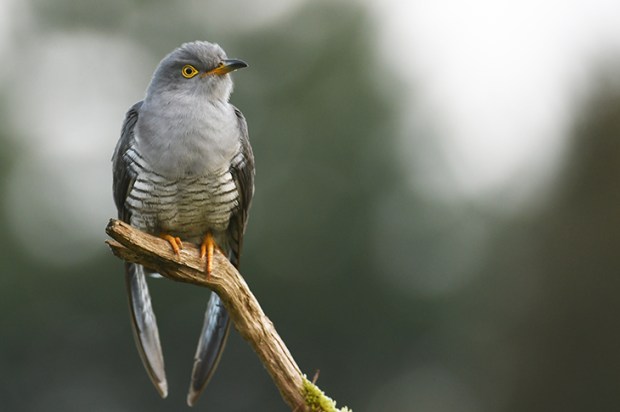Would you describe yourself as an ‘environmentalist’? I would, mainly to annoy greenies, but also because it’s true. If your definition of an environmentalist is someone who loves immersing himself in the natural world, makes a study of its ways and cares deeply about its future, I’m at least as much of one as David Attenborough.
But I can see why many fellow nature lovers might balk at the term, especially now that it has become so grievously politicised. That would explain the recent Gallup poll — it was taken in the US but I suspect it applies to Britain too — showing how dramatically this label has plunged in popularity. In 1991 the majority of Americans self-identified as environmentalists — 78 per cent of them. Now, it’s just 42 per cent: less than half.
Why has the term so fallen out of favour? Well there’s perhaps a clue in the fact that the decline has been far more precipitous among Republicans (down to 27 per cent) than among Democrats (down to 56 per cent). In other words, where 25 years ago the environment was considered everyone’s domain, it has since been hijacked by the left and turned into yet another partisan issue.
If you believe the greenies, the blame for this lies with an intransigent right so imprisoned by ideology that it stubbornly denies ‘the science’. Actually, though, I’d say it has more to do with the militant left exploiting environmentalism as a fashionable cloak for its ongoing war on liberty, free markets and small government.
Note the tactics. Like the Viet Minh or the Taleban, the environmental movement has become hugely skilled in the art of asymmetric warfare. The number of true believers is much smaller than you’d think — but they’ve managed in recent years to punch massively above their weight by infiltrating all the key positions of influence and by terrorising those who disagree with them.
Challenge the ‘consensus’ — whether you’re a scientist like Willie Soon or even a cuddly TV presenter like David Bellamy or Johnny Ball — and these people will stop at nothing to try to destroy your career. This is the tactic that the Marxist urban revolutionary Saul Alinsky advised in his manifesto Rules for Radicals: ‘Pick the target, freeze it, personalise it and polarise it.’
Which goes some way towards explaining, I think, why in private people tend to be more vocally sceptical about stuff like global warming or the pointlessness of recycling or carbon taxes etc. than they are in public. No one wants to be caught speaking out of turn by the green Stasi, for fear of the consequences for their reputation or their job prospects.
Look at what happened to our own Matt Ridley when he applied for the chairmanship of the Natural History Museum. A distinguished, Oxford-educated scientist and a brilliant, internationally respected communicator, Ridley would have been perfect for the job. But as Charles Moore reported in his Notes the other week, Ridley’s mild climate scepticism ruled him out of contention.
When you write about this sort of thing, you run the risk of being tarred by the green lobby as a paranoid conspiracy theorist. Again, this is very much part of the environmentalist modus operandi. Activists like Bob Ward of the Grantham Institute and Richard Black of the Energy and Climate Intelligence Unit are paid handsomely to pour ridicule on ‘deniers’, make noisy complaints to the press regulator Ipso and concoct letters like the one recently sent to the editor of the Times warning that by giving voice to sceptics he was turning his paper into a ‘laughing stock’.
The letter (sent privately, but leaked in the Guardian) was signed by no fewer than 13 members of the House of Lords, several of them scientists, who had held distinguished offices ranging from Astronomer Royal and president of the Royal Society to chairman of the Financial Services Authority. Any casual observer might naturally assume that such pillars of the establishment must have a point.
It’s only if you’re familiar with the territory that you realise how often the same names — Lords May, Rees, Stern and Deben; Sir Crispin Tickell; Sir Paul Nurse, et al — recur with tiresome regularity. Probably in their fields they were once rather good. But since then prestige has gone to their heads and they’ve turned into professional political activists brandishing a spurious environmental authority which is all too persuasive to people who don’t know better.
This is precisely the strategy that one of the progenitors of cultural Marxism, Antonio Gramsci, was advocating when he talked about the ‘long march through the institutions’. In order to dominate the political argument, he realised, you don’t necessarily need to be in government. You just need to make sure you’ve nobbled all the influential posts in academe, the media, the arts, big business and so on.
Not all these figures are on the left. Lord Deben — still best known for the incident when, as John Selwyn Gummer, he publicly fed his young daughter a beefburger to show us we weren’t all going to die of BSE — no doubt thinks of himself as a Conservative.
Nor are they all necessarily political. Some are in it for the money (remember, this is now an annual $1.5 trillion industry, so there’s plenty of trough room for the snouts); some — luvvies especially — are in it because all their mates are; some because they’ve taken the environmentalists at their word and genuinely, sincerely believe that this is about saving the planet.
But regardless of their motivation, the result is always the same: bigger government, higher taxes, more regulation, less freedom. Ordinary people can smell a rat, even if they’re not quite sure where the body is or why it’s stinking. They just know something’s rotten in the state of environmentalism; they don’t want to be tainted by it, and very sensible they are too.
Got something to add? Join the discussion and comment below.
Get 10 issues for just $10
Subscribe to The Spectator Australia today for the next 10 magazine issues, plus full online access, for just $10.
You might disagree with half of it, but you’ll enjoy reading all of it. Try your first month for free, then just $2 a week for the remainder of your first year.















Comments
Don't miss out
Join the conversation with other Spectator Australia readers. Subscribe to leave a comment.
SUBSCRIBEAlready a subscriber? Log in